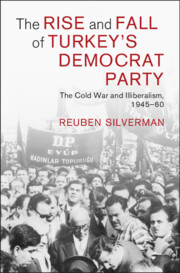Refine search
Actions for selected content:
640 results
3 - From Religious to Nationalist Subjectivities
-
- Book:
- Nationalism as a Way of Life
- Published online:
- 11 December 2025
- Print publication:
- 11 December 2025, pp 83-116
-
- Chapter
- Export citation
Big fish eat little fish: expanding commodity frontiers of farmed sea bass and sea bream in Turkey and West Africa
-
- Journal:
- New Perspectives on Turkey , First View
- Published online by Cambridge University Press:
- 05 December 2025, pp. 1-27
-
- Article
-
- You have access
- Open access
- HTML
- Export citation
Raising the “Muslim child”: Quran kindergartens in Turkey and the Justice and Development Party’s cultural hegemony
-
- Journal:
- New Perspectives on Turkey , First View
- Published online by Cambridge University Press:
- 05 December 2025, pp. 1-19
-
- Article
-
- You have access
- Open access
- HTML
- Export citation
Beyond rupture and integration: decolonial recognition in the Kurdish struggle
-
- Journal:
- New Perspectives on Turkey , First View
- Published online by Cambridge University Press:
- 26 November 2025, pp. 1-21
-
- Article
-
- You have access
- Open access
- HTML
- Export citation
1 - The Transformation Box
-
- Book:
- Pious Politics
- Published online:
- 21 October 2025
- Print publication:
- 30 October 2025, pp 1-31
-
- Chapter
- Export citation

The Rise and Fall of Turkey's Democrat Party
- The Cold War and Illiberalism, 1945–60
-
- Published online:
- 23 October 2025
- Print publication:
- 06 November 2025

Pious Politics
- Cultural Foundations of the Islamist Movement in Turkey
-
- Published online:
- 21 October 2025
- Print publication:
- 30 October 2025
Introduction
-
- Book:
- Türkiye, Iran, and the Politics of Comparison
- Published online:
- 21 September 2025
- Print publication:
- 09 October 2025, pp 1-29
-
- Chapter
- Export citation
2 - A Modern Empress
-
- Book:
- Türkiye, Iran, and the Politics of Comparison
- Published online:
- 21 September 2025
- Print publication:
- 09 October 2025, pp 75-114
-
- Chapter
- Export citation
Martyrs, Dreams, and Past Lives: Insurgent Immortality and the Expansive Logic of Debt
-
- Journal:
- Comparative Studies in Society and History , First View
- Published online by Cambridge University Press:
- 26 September 2025, pp. 1-25
-
- Article
-
- You have access
- Open access
- HTML
- Export citation
A historical–relational approach to governance through states of emergency: from spectacular to non-spectacular settings in Turkey
-
- Journal:
- New Perspectives on Turkey , First View
- Published online by Cambridge University Press:
- 25 September 2025, pp. 1-21
-
- Article
-
- You have access
- Open access
- HTML
- Export citation
Life As a Soap Opera: Imaginaries of Romance and Social Prestige among Young Brides in Turkey
-
- Journal:
- International Journal of Middle East Studies , First View
- Published online by Cambridge University Press:
- 15 September 2025, pp. 1-24
-
- Article
-
- You have access
- Open access
- HTML
- Export citation
Film-Making the Nation Great Again: Audio-visualizing History in the Authoritarian Toolkit
-
- Journal:
- Perspectives on Politics , First View
- Published online by Cambridge University Press:
- 10 September 2025, pp. 1-33
-
- Article
-
- You have access
- Open access
- HTML
- Export citation
Authoritarian Legacies in Law and Democratic Backsliding: The Case of Turkey’s Specially Authorized Courts
-
- Journal:
- Law & Social Inquiry , First View
- Published online by Cambridge University Press:
- 01 September 2025, pp. 1-28
-
- Article
-
- You have access
- Open access
- HTML
- Export citation
Demand for Plant-Based Meat Alternatives and the Role of Habit Formation and Variety Seeking
-
- Journal:
- Journal of Agricultural and Applied Economics / Volume 57 / Issue 4 / November 2025
- Published online by Cambridge University Press:
- 07 August 2025, pp. 606-632
-
- Article
-
- You have access
- Open access
- HTML
- Export citation
Turkey as a “Geopolitical Other”: The Construction of European Identities in the Geopolitical Era and its Implications for EU–Turkey Relations
-
- Journal:
- European Journal of Risk Regulation , First View
- Published online by Cambridge University Press:
- 23 July 2025, pp. 1-20
-
- Article
-
- You have access
- Open access
- HTML
- Export citation
Leadership decapitation in civil war: Leadership arrest and the negotiations between the state and the insurgents
-
- Journal:
- Review of International Studies , First View
- Published online by Cambridge University Press:
- 21 July 2025, pp. 1-21
-
- Article
-
- You have access
- Open access
- HTML
- Export citation
Cooking Shows as Gender Edutainment in Authoritarian Regimes: Recipe for (New) Turkey
-
- Journal:
- Politics & Gender , First View
- Published online by Cambridge University Press:
- 04 July 2025, pp. 1-30
-
- Article
-
- You have access
- Open access
- HTML
- Export citation
Beyond the quest for a technological holy grail: patterns of income inequality and the household carbon footprint in Turkey
-
- Journal:
- New Perspectives on Turkey / Volume 73 / November 2025
- Published online by Cambridge University Press:
- 02 July 2025, pp. 4-31
-
- Article
-
- You have access
- Open access
- HTML
- Export citation
104 - Türkiye
- from Subsection 9D - International – Middle East
-
-
- Book:
- Observation Medicine
- Published online:
- 27 June 2025
- Print publication:
- 26 June 2025, pp 645-648
-
- Chapter
- Export citation
